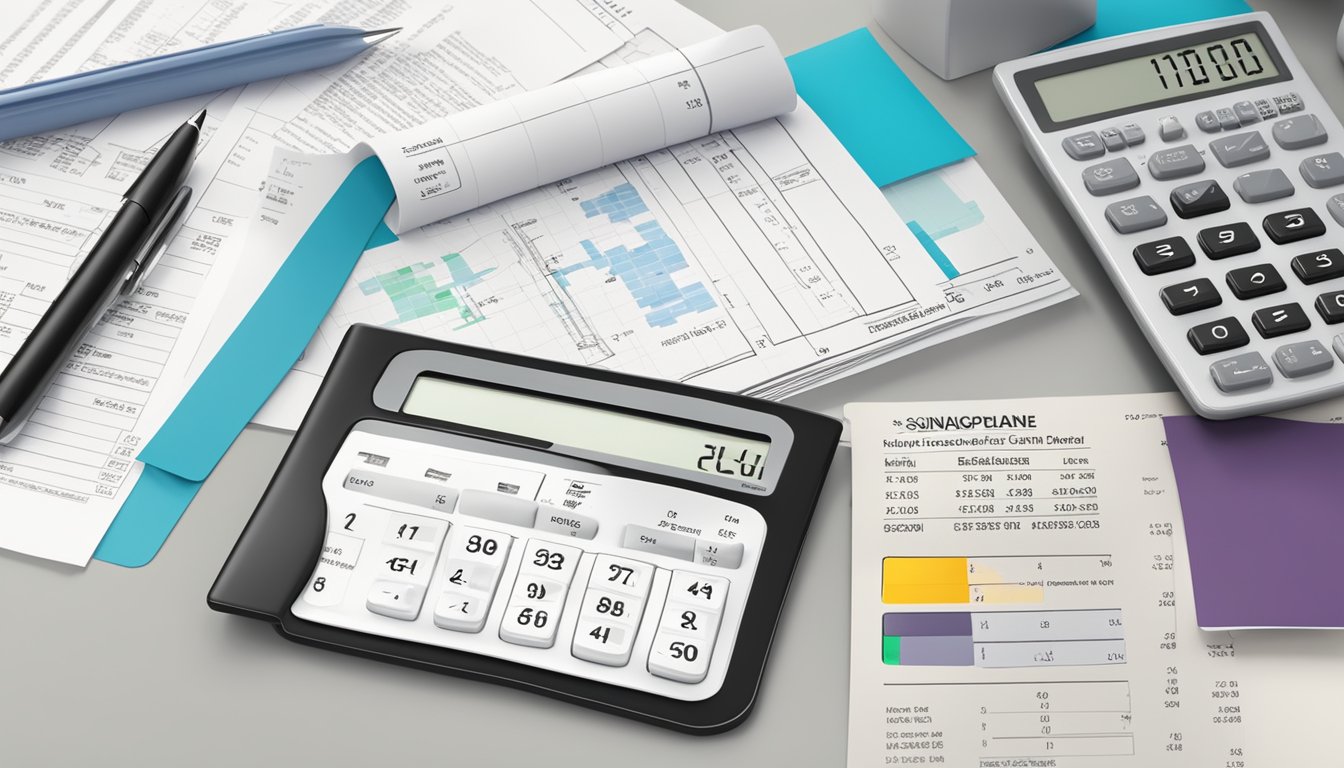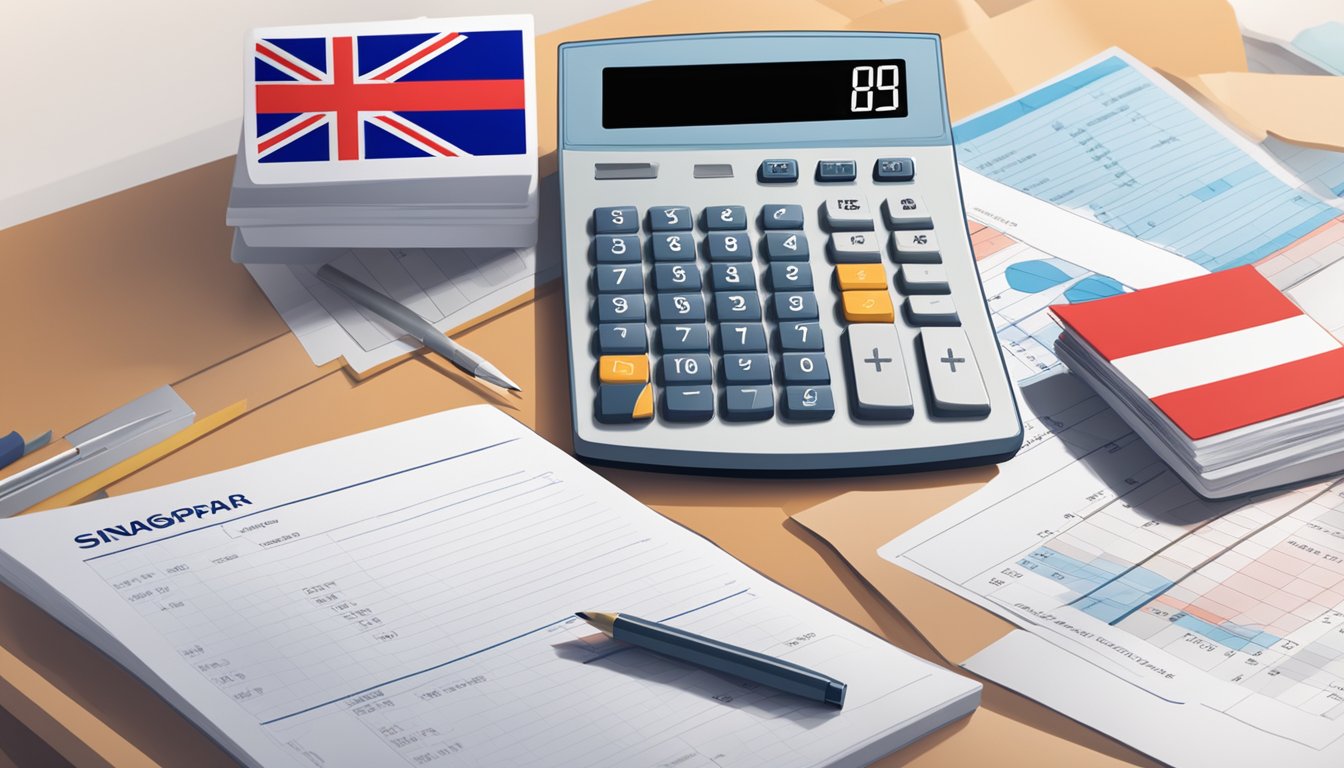Calculating home interest in Singapore can be a daunting task for many homeowners. However, it is a crucial step in managing your finances and ensuring that you can afford your home loan. Understanding how to calculate home interest is essential for anyone who wants to take out a mortgage in Singapore.

When it comes to home loans in Singapore, there are several factors to consider. These include the loan amount, interest rate, loan tenure, and repayment amount. The interest rate is a critical factor that determines the total amount of interest you will pay over the loan period. Therefore, it is essential to understand how interest rates are calculated and how they affect your monthly repayments.
Calculating home interest in Singapore requires a basic understanding of the loan amount, interest rate, and loan tenure. Once you have these figures, you can use a mortgage calculator to determine your monthly repayment amount. You can also explore different interest rates and repayment options to find the most affordable loan for your needs. By taking the time to calculate your home interest, you can ensure that you make informed decisions about your finances and maximise your loan affordability.
Key Takeaways
- Understanding the loan amount, interest rate, and loan tenure is essential for calculating home interest in Singapore.
- Using a mortgage calculator can help you determine your monthly repayment amount and explore different interest rates and repayment options.
- Calculating your home interest can help you make informed decisions about your finances and maximise your loan affordability.
Understanding Home Loans in Singapore

When it comes to buying a home in Singapore, most people will need to take out a home loan or mortgage. This is where a bank or other financial institution lends you the money you need to purchase your home, and you pay it back with interest over a set period of time.
Types of Home Loans
There are two main types of home loans available in Singapore: HDB loans and bank loans. HDB loans are offered by the Housing and Development Board and are only available for the purchase of HDB flats. Bank loans, on the other hand, are offered by commercial banks and can be used to purchase both HDB flats and private properties.
Factors Affecting Loan Eligibility
When applying for a home loan in Singapore, there are a number of factors that will affect your eligibility. These include your income, credit score, age, employment status, and the type of property you are looking to purchase.
In addition, there are also regulations in place that limit the amount of money you can borrow based on your income. The Total Debt Servicing Ratio (TDSR) framework, for example, limits your monthly debt repayments to 60% of your monthly income.
It’s important to keep all of these factors in mind when applying for a home loan, as they can have a significant impact on your ability to secure the financing you need.
Overall, taking out a home loan is a big financial commitment, but it can also be a great way to achieve your dream of owning your own home in Singapore. By understanding the different types of home loans available and the factors that affect your eligibility, you can make an informed decision and find the right loan for your needs.
Calculating Your Home Loan

If you are planning to purchase a property in Singapore, it’s important to understand how to calculate your home loan. This will help you determine the maximum loan amount and tenure you can afford, as well as the monthly instalment you will be required to pay.
Using a Mortgage Calculator
One of the easiest ways to calculate your home loan is by using a mortgage calculator. This tool allows you to input your loan amount, interest rate, and loan tenure, and it will calculate your monthly instalment for you. You can find mortgage calculators online, and many banks and financial institutions also offer them on their websites.
Determining Loan Amount and Tenure
When calculating your home loan, you will need to determine the maximum loan amount and tenure you can afford. The maximum loan amount is determined by the property purchase price, as well as your income and other financial obligations. In Singapore, the maximum loan amount is regulated by the Total Debt Servicing Ratio (TDSR) framework, which limits your monthly loan payments to 60% of your income.
The maximum loan tenure is also regulated by the government, and it varies depending on the type of property you are purchasing. For HDB flats, the maximum loan tenure is 25 years, while for private properties, it is 35 years.
To determine your maximum loan amount and tenure, you can use a mortgage calculator or consult with a financial advisor. Keep in mind that the longer your loan tenure, the lower your monthly instalment will be, but the more interest you will end up paying in the long run.
In addition to the loan amount and tenure, you will also need to factor in other costs such as stamp duty, legal fees, and property taxes. These costs can add up quickly, so it’s important to budget for them accordingly.
Overall, calculating your home loan can seem daunting at first, but with the right tools and guidance, it can be a straightforward process. By understanding the maximum loan amount and tenure you can afford, as well as the other costs associated with purchasing a property, you can make an informed decision and find the home of your dreams.
Exploring Interest Rates and Repayment

When it comes to calculating your home loan interest in Singapore, there are a few things you need to keep in mind. The interest rate is a critical factor that determines how much you’ll be paying each month. Understanding how interest rates work and how they impact your monthly repayment is essential.
Impact of Interest Rates on Repayments
The interest rate is the percentage of the principal amount that you’ll be paying back to the lender. It’s the cost of borrowing money. The higher the interest rate, the more you’ll have to pay back. When you take out a mortgage, the interest rate will be fixed or variable. A fixed interest rate means that your monthly repayment will remain the same throughout the loan tenure. A variable interest rate means that your monthly repayment will fluctuate based on market conditions.
For example, if you take out a home loan of $500,000 with a fixed interest rate of 2.5% over a 10-year period, your monthly repayment will be $4,713. However, if you decide to extend the loan tenure to a 30-year period, your monthly repayment will be reduced to $1,976. The longer the loan tenure, the lower the monthly repayment, but the higher the total interest cost.
Understanding Amortisation
Amortisation is the process of paying off your mortgage over time. Each monthly repayment consists of two parts: principal and interest. The principal amount is the amount you borrowed, and the interest is the cost of borrowing money. At the start of your mortgage, most of your monthly repayment will go towards paying off the interest. As you make more payments, the proportion of your repayment that goes towards the principal amount will increase.
To understand how your monthly repayment is calculated, you can use a mortgage calculator. You’ll need to input the principal amount, interest rate, and loan tenure. The calculator will then show you how much you’ll be paying each month. Keep in mind that the monthly repayment is just an estimate, and the actual amount may vary based on market conditions.
In conclusion, understanding how interest rates and amortisation work is essential when calculating your home loan interest in Singapore. By doing your research and using a mortgage calculator, you can get a better idea of how much you’ll be paying each month and how long it will take to pay off your mortgage.
Maximising Loan Affordability

When it comes to buying a home, one of the most important factors to consider is affordability. In Singapore, there are several ways to maximise your loan affordability, including leveraging the Total Debt Servicing Ratio (TDSR) and assessing Loan-to-Value (LTV) limits.
Leveraging the Total Debt Servicing Ratio
The TDSR is a measure of your ability to service all your debt obligations, including your home loan. It takes into account your gross monthly income and all your debt obligations, such as credit card debt, car loans, and personal loans. The TDSR limit is set at 60% of your gross monthly income.
To maximise your loan affordability, you can reduce your debt obligations before applying for a home loan. You can also increase your gross monthly income by taking on a higher-paying job or starting a side business.
Assessing Loan-to-Value (LTV) Limits
The LTV limit is the maximum amount of money you can borrow for your home, expressed as a percentage of the property’s value. For example, if the LTV limit is 80%, and the property is worth $500,000, you can borrow up to $400,000.
To maximise your loan affordability, you can assess the LTV limits of different banks and choose the one with the highest LTV limit. You can also increase your down payment to reduce the amount you need to borrow.
In conclusion, maximising your loan affordability is crucial when buying a home in Singapore. By leveraging the TDSR and assessing LTV limits, you can increase your chances of getting approved for a home loan and secure your dream home.
Additional Financial Considerations

When it comes to calculating your home loan interest in Singapore, there are additional financial considerations that you need to keep in mind. These include incorporating CPF and insurance, as well as factoring in stamp duty and other costs.
Incorporating CPF and Insurance
Incorporating CPF savings and insurance into your home loan repayment plan can help reduce your monthly instalments and overall interest payable. You can use the CPF housing usage calculator to gauge how much OA savings you can use to fund your housing purchase.
Additionally, you can consider purchasing mortgage insurance, which can provide financial protection in the event of unforeseen circumstances such as death, disability, or job loss. This can help ensure that your loved ones are not burdened with the financial responsibility of your home loan.
Factoring in Stamp Duty and Other Costs
When purchasing a property in Singapore, you will need to factor in additional costs such as buyer stamp duty, legal fees, and renovation costs. It is important to have a clear understanding of these costs upfront to avoid any surprises later on.
Buyer stamp duty is calculated based on the purchase price of the property and can range from 1% to 4%. Legal fees can also vary depending on the complexity of the transaction and the lawyer you engage.
It is also important to factor in renovation costs, as these can add up quickly. You may want to consider taking out a personal loan or using your credit card to cover these costs, but be sure to factor in the additional interest payable.
By incorporating these additional financial considerations into your home loan repayment plan, you can better manage your finances and ensure that you are able to comfortably afford your monthly mortgage payments.
Frequently Asked Questions

How can one compute the monthly interest on a home loan in Singapore?
To calculate the monthly interest on a home loan in Singapore, you need to use the following formula: (Outstanding loan amount x Interest rate) ÷ 12 = Monthly interest. This means that the amount of interest paid is the highest at the start of the mortgage and decreases with each subsequent payment.
What steps are involved in using a mortgage calculator for Singapore properties?
Using a mortgage calculator for Singapore properties is straightforward. You need to input the loan amount, interest rate, and loan tenure, and the calculator will provide the monthly repayment amount. Some calculators may also factor in additional costs like stamp duty and legal fees.
Could you explain the method for calculating HDB loan interest?
HDB loan interest is calculated based on the prevailing CPF interest rate plus 0.1%. The interest rate is reviewed quarterly and is subject to change. The interest is computed on a monthly rest basis, meaning that the interest is calculated based on the outstanding loan balance at the end of each month.
In what way is the interest for housing loans determined?
The interest for housing loans is determined by the prevailing market interest rates and the bank’s cost of funds. Banks may also factor in additional costs like risk and administrative costs when setting their interest rates.
Where can I find a history chart of Singapore mortgage interest rates?
You can find a history chart of Singapore mortgage interest rates on the websites of the Monetary Authority of Singapore (MAS) and the Housing and Development Board (HDB). These charts provide historical data on interest rates for housing loans in Singapore.
What’s the secret formula for working out your home loan interest payments?
The secret formula for working out your home loan interest payments is to use a mortgage calculator or to use the formula: (Outstanding loan amount x Interest rate) ÷ 12 = Monthly interest. This will give you an estimate of your monthly interest payments, which you can use to plan your finances.




